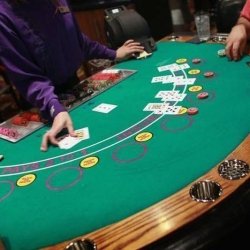
The Seminole Tribe had withheld $220 million in tax revenues since Judge Hinkle ruled on their behalf in 2016.
The State of Florida came to a $340 million settlement with the Seminole Tribe of Florida over banked card games. As a result, Florida’s government will order parimutuel racetracks to stop offering specific types of table games in their facilities.
To gain the state’s backing for a monopoly on banked games, the Seminole Tribe agreed to continue making monthly revenue sharing payments for the remaining 13 years. The deal ends a federal lawsuit filed by the Seminole Tribe against the state.
It also frees more than $220 million in tribal state taxes which were being held in escrow, pending a successful resolution to the lawsuit.
Besides getting their hands on the $220 million in gaming tax revenues now, Florida receives another $120 million that will become available for the next fiscal year.
Seminoles Maintain Banked Games Monopoly
The Seminoles now have a gaming monopoly in the State of Florida for blackjack, as well as banked games like Ultimate Texas Hold’em and 3-Card Poker. At times, the Seminole Tribe has tried to include other games on the list of designated player games or banked card games, like craps and roulette, though those games are left off the agreement between Florida and the tribe.
At the same time, electronic gaming machines which simular blackjack or slot machines are included in the agreement. The parimutuel racetracks, which began offering banked card games again in June, will be banned from offering such games over the next 13 years.
Under terms of the agreement, the Florida Department of Business and Professional Regulation (DBPR) is charged with enforcing the rules involving blackjack and slots.
DBPR Secretary Jonathan Zachem said in a press release, “DBPR is glad that the state of Florida has reached an agreement to resolve the ongoing litigation between the state and the Seminole Tribe. This agreement ensures the continuity of the current Seminole compact and does not allow for any expansion of gaming.”
Rick Scott Deal with Seminoles
Thus ends a lawsuit which began in 2015. The tribe filed suit in the final stages of a negotiation between Gov. Rick Scott and the Seminoles. The two sides came to an agreement in December 2015, but the state legislature failed to approve the agreement.
Gary Bitner, a spokesman for the Seminole Tribe, said, “The settlement agreement ensures a stable future for the members and employees of the Seminole Tribe of Florida, and the Tribe appreciates the hard work of Gov. Scott and DBPR to get it done.”
Judge Robert Hinkle’s Ruling
After the December 2015 deal fell through, the Seminoles received a legal victory in 2016 from U.S. District Judge Robert Hinkle. The tribe could suspend payments to the state, if those payments were placed in escrow. The fact Florida was not receiving payments under the defunct 2010 gaming compact’s terms meant that state officials had to negotiate in good faith. Armed with leverage in the deal, the Seminole Tribe was able to gain the upper hand in its long controversy with the racetracks.
Judge Hinkle ruled that the player-banked games act in the same way that games organized by the Seminoles did, because they allow players to serve as bankers. That meant Florida broke the terms of the 5-year gaming compact negotiated in 2010.
This is the second time the two dozen Florida racetracks had offered “player banked card games“, and is now the second time that practice has been banned by the state. Player banked card games pit player-versus-player, because one designated player acts as the banker in the game (covering the bets). As a general rule in table games, the casino acts as the banker.
Barry Richard: “Everybody Benefits”
Barry Richard, attorney for the Seminole Tribe, termed the $340 million deal as a win-win situation. Richard said, “The settlement is one of the rare incidents where everybody benefits. Nobody gave up anything. The state has an immediate infusion of money, and the tribe gets to continue its games.”
That is not necessarily true. The parimutuel racetracks are required to stop offering lucrative games under the deal, so they are the big losers in the settlement.
Of course, that assumes the parimutuel gaming venues ever had the right to offer such games in the first place. If one looks at their boosted revenues during the periods they offered player-banked games as bonus money, then an onlooker could say they gained from the lengthy negotiations, as state officials looked the other way while they offered such games.
